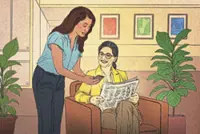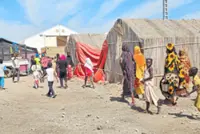We shudder with horror and disbelief when we read in the papers about caregivers in aged care homes physically abusing the elderly in their care. We cannot fathom how anyone could cause pain and injury to frail and defenseless old people.
Caring for the elderly requires a lot of patience, tolerance and dedication. It’s a calling, and if you don’t have it, you will end up inflicting harm on the very people you are supposed to look after! You are not cut out for the profession. QUIT!
Feeding, bathing and changing the diapers of an 80-year-old is vastly different from performing the same tasks for a cherubic, adorable eight-month-old. It takes super-human patience and infinite compassion to do so 24 hours a day often with no break or day off. Not everyone can handle the stress, especially caring for the frail elderly with dementia, who cannot understand you or follow instructions.
Caring for the elderly exerts a heavy toll on the mental state of the carer. If you are still working, think twice about leaving your elderly parent alone in the care of a full-time maid who is doing the job solely for the salary. Most domestic helpers are not trained as caregivers.
While we hear of elder abuse cases in aged care homes, in reality, there are more cases of elder abuse at the hands of family members. Statistics in the Health Ministry’s National Health and Morbidity Survey 2018 found that one in 11 elderly were at risk of abuse at the hands of someone they trust.
The figures are expected to rise in tandem with the changing demographics. Malaysia is on track to reach aged nation status by 2040.
The elderly from lower socio-economic strata are the most vulnerable to abuse and exploitation. It is not uncommon to hear of adult children exploiting their elderly parents for their own financial gains. Examples include compelling their parents to prematurely sign over ownership of the family property to them, or transferring shares to their names. For whatever reasons, these children can’t wait to inherit from their parents.
That would take too long. We have read in the media of cases where elderly parents have been evicted from their own home by their children. Money over-rules blood ties. In a society where cash is king, and wealth equals power, the elderly without much assets to their name have no voice, no rights. They become easy victims of elder abuse.
The most common abuse is verbal or emotional. In moments of stress, anger or frustration, family carers lose patience with their elderly parents, chiding them, belittling them, even threatening them with the possibility of packing them off to a welfare home for old folks. They are ignored, neglected, even shamed in front of others, and constantly told they are “useless” and “should die quickly”.
There have been reports of children abandoning their elderly parents in hospitals or at bus stops.
End the stigma and shame
Most abused parents would rather suffer in silence than go public about their ungrateful children. After all, who would want to lose face by dragging their family name through the mud?
But the neighbours are aware. They have seen the bruises; they have heard the cries. But few would make a report as, “It’s none of my business. It’s a family matter.”
There are also highly educated, successful adult children who are ashamed of their illiterate parents. They have no qualms or guilt about confining their parents to a room at the back of the house with strict orders not to come out when there are visitors or guests in the house.
Are these cases in the minority or are they the tip of the iceberg?
What is the world coming to when children can chase their parents out into the streets, siphon off their savings or isolate them from their friends?
Is this a failure of our education system or a breakdown of the family system, or both?
Filial piety is becoming rare these days. Countries such as Singapore and India have implemented the Maintenance of Parents Act whereby parents can report their adult children to a tribunal for failure to provide financial support and care.
When adult children face problems in their business or marriage, or are struggling with heavy debts, it is easy to take out their frustrations on their elderly parents who are vulnerable and unable to defend themselves. Life becomes unbearable for their elderly parents. It is no wonder many say they prefer to die than suffer at the hands of their own children.
If we do not want our children to treat us this way, then we should not treat our aged parents this way. Let us set a good example by according our parents and all elderly the respect they deserve. We exist because of them. We are who we are today because of them. We owe them a lifetime of gratitude and love.
It may sound rather selfish, but retirees must protect their retirement funds and their home if they choose to age in place. Keep working if you are physically able to be financially independent for as long as possible. There are just too many horror stories of abandoned or abused elderly.
What to do
Here are some things parents can do to reduce the risks of ending up abused or abandoned by their own children:
• Continue to build your nest egg and make sure you are not financially dependent on your children when you reach old age
• Look after your health so that you remain physically active and independent as long as you can, right into your 70s, 80s and beyond.
• Protect your property. Do not hand over the deeds of your house prematurely. You need to ensure a roof over your head at all times.
• Have a network of friends you can count on to support you through the difficult times
• Seek professional help or counselling especially if you feel suicidal
• Know you are not alone in this. Join a support group.
One day, it will be our turn to experience old age. Will we fall victim to elder abuse? Not if we raise awareness of this despicable social ill, not if we raise our children to respect our elders. We can be good examples by showing our children how we care for our parents. They will learn from us.
The Chinese have a saying that translates to, “When the children are big, it is their world”. How true, especially when it involves money and property. When elderly parents have to depend on their adult children for a roof over their head or food on the table, they lose all say in matters of importance.
The key lies in building a strong bond between parents and children, and nurturing this bond through the years. Children who are neglected or abused, are more likely to grow into adults who are abusive towards their parents.
The advice to young parents – teach your children universal values, including filial piety and responsibility. Be good role models yourself. Do not give them a chance to turn around one day and say, “But ma and pa, you never really took care of us when we were young, so don’t expect us to take care of you in your old age.”
How we treat our elderly parents will determine how our children will treat us in our twilight years.
Lily Fu is a gerontologist who advocates for seniors. She is founder of SeniorsAloud, an online platform for seniors to get connected and enjoy social activities for ageing well.





